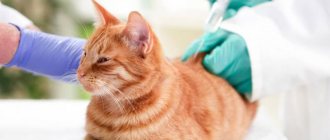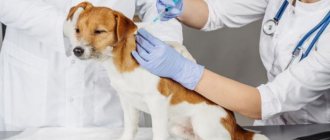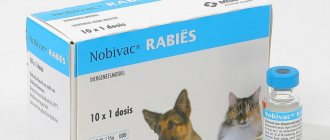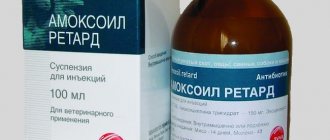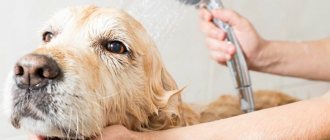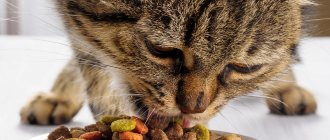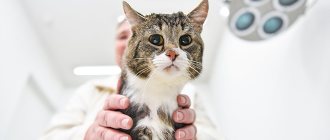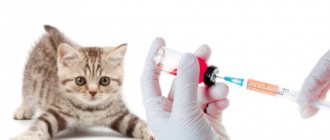Rabies is still considered one of the most dangerous diseases in veterinary medicine and medicine. This happens because this pathology (after the appearance of clinical symptoms) is incurable. The only protection is timely vaccination. Pet owners need to know how long quarantine lasts after vaccination against rabies in cats.
Why is cat vaccination necessary?
Vaccination of cats is an effective measure to prevent a number of diseases, aimed at stimulating the production of antibodies that destroy active viruses that enter the animal’s body in case of infection. Simply put, vaccinations develop immune protection against various infections that provoke the development of deadly diseases.
In veterinary clinics, domestic cats are vaccinated at the request of the owner himself, who wants to protect his pet from the risks of contracting infections.
Vaccinations are recommended for all domestic cats without exception, even those who do not go outside at all. Viruses can spread through food and water. Even the most caring owner can become the culprit of a cat infection, bringing a dangerous infection into the house on clothes or the soles of shoes.
What happens if you don’t comply with the quarantine deadlines?
Violation of quarantine conditions after vaccination can cause a lot of problems: from an increased risk of contracting a dangerous infection to a ban on crossing the border or isolating the animal.
Even if the risk is small, you should not neglect the advice of veterinarians, because the health and life of your little furry friends is of great value. If your cat is vaccinated against rabies on time and after vaccination maintains quarantine according to all the rules, then it will strengthen its immunity and live a long and comfortable life next to its caring owner.
What diseases are vaccinated against?
According to the vaccination calendar, cats are recommended to be vaccinated according to age against several of the most dangerous diseases.
What diseases is it recommended to vaccinate your cat against?
- Rabies (rabies) is a deadly infectious disease that cannot be cured. Manifests itself with severe symptoms that occur 2-3 days after infection. Infected animals and rodents are carriers of the infection.
- Rhinotracheitis is a herpesvirus infectious disease that affects the respiratory and visual organs. Has an acute course. The carriers of the virus are sick cats. Mortality occurs in 20% of cases.
- Calcivirosis is a common infectious disease of cats, transmitted from other members of the genus who are carriers of the insidious virus. The risk of death is more than 80%.
- Viral peritonitis is an infectious disease caused by coronavirus. Infection occurs through airborne droplets after contact with a carrier of the infection. The risk of death is very high (more than 90% of cats die).
- Panleukopenia is an acute viral disease also known as feline distemper. Sick or already ill cats serve as spreaders of infection. Difficult to treat. Causes critical symptoms. The risk of death is 90%.
- Chlamydia is a contagious feline disease of an infectious nature with a severe and long-term course. The main carriers of infection are birds and rodents. The disease affects the genitourinary, respiratory, visual and digestive systems. There are risks of infecting people.
- Microsporia is a skin disease also known as ringworm. Carriers of infection are sick animals. A cat with microsporia often infects its owner. The most popular drugs for vaccinating cats against various infections: Nobivak, Quadrikat, Multifel-4, Microderm, Leukotsel, Felovax-4, etc. The drug will be selected by the attending veterinarian.
Quarantine after rabies vaccination in cats: is it necessary or not?
Rabies is still considered one of the most dangerous diseases in veterinary medicine and medicine. This happens because this pathology (after the appearance of clinical symptoms) is incurable. The only protection is timely vaccination. Pet owners need to know how long quarantine lasts after vaccination against rabies in cats.
This question may arise for anyone familiar with modern rabies vaccines. The fact is that they are made not from living, but from dead cultures of the pathogen.
Simply put, these vaccines cannot cause rabies under any circumstances. Therefore, quarantine seems to be unnecessary (in the classical sense of the term).
What is quarantine and why is it needed?
So, what is quarantine and why is it needed? Quarantine itself is the time for which an animal is isolated from the environment, other animals and people. So what is it even needed for? It's simple:
- Quarantine is required not to protect other animals and people, but to protect the cat. The problem is that immunity from rabies does not develop immediately after vaccination. This takes some time. You need to clearly understand that during this period a cat bitten by a sick animal is highly likely to get sick. Therefore, during this period (from the moment of vaccination to the formation of immunity), the pet must be strictly isolated from contact with the environment and other cats.
- Finally, there is a certain probability (minuscule, but still) that the vaccinated cat is already sick. In this case, the quarantine is “true”, i.e. helps prevent infection of others. But let us repeat - the likelihood of such a scenario in practice is negligible, since any sane breeder, seeing a cat that has been bitten and shows signs of a fight, will in any case show it to the veterinarian.
What happens if you don’t comply with the quarantine deadlines?
Many inexperienced breeders are interested in one question: “What will happen if you do not comply with the quarantine terms?” We will try to answer it in as much detail as possible.
I would immediately like to warn cat owners that failure to comply with vaccination and quarantine deadlines is far from the best solution.
In this case, the owner puts at risk not only himself, but also all people who in one way or another come into contact with this animal.
So here are the possible options:
- Most likely, nothing bad will happen, but only on the condition that the animal does not walk on the street and is not taken to various exhibitions and similar events.
- It should be taken into account that all information about rabies vaccinations must be recorded in the animal’s veterinary passport. This means that until the end of quarantine the cat will not be able to be taken to the exhibition (more precisely, it will be possible to take it, but it will not be allowed to participate). It will also not be possible to go on vacation with your pet, since they can “wrap” it even within the Russian Federation, not to mention leaving it outside our country.
- The worst option (which you could already guess about) is that the cat is bitten by a sick cat (or a wolf, a bear, etc.), after which he gets sick.
But! As for the last case, everything is not so obvious.
The fact is that immunity in a normal, healthy cat begins to develop within about seven days from the moment of the bite. If everything is in order, then even after direct contact with a sick animal, the pet may not get sick.
In this case, veterinarians resort to “classic” quarantine: they isolate the cat for about ten days and wait to see if it shows signs of rabies.
Again, this option is not very good, since there will still be a possibility that the cat has become infected.
Thus, the conclusion is simple: you shouldn’t joke with post-vaccination quarantine, since such negligence can have a very bad impact on the future fate of both the cat and its owner.
Development of immunity: nuances
We have already touched upon this issue indirectly a little higher. The fact is that the development of immunity in each animal is a unique process and highly dependent on the characteristics of the body of a particular cat. In some pets it happens faster, in others it happens slower.
This depends on many factors:
- Physical state. The body of a moderately well-fed and absolutely healthy cat will develop immunity three times faster than if compared to a weakened and middle-aged animal (in general, in the latter case, pets should be vaccinated with caution).
- As we already mentioned, age. The younger the pet, the healthier it is, and the faster its defense systems develop immunity (which in this case will be stronger).
- This depends in part on the type of specific rabies vaccine. However, this moment has a greater impact on the maximum duration of immunity, but not on the speed of its formation.
- Quality of nutrition, balanced diet in terms of nutrients, macro- and microelements. The better a cat eats, the faster it will develop high-quality, strong immunity. Accordingly, this is precisely what the standard recommendation of veterinarians is connected with: to feed your pets as best as possible before vaccination.
I would like to emphasize one important circumstance: despite all of the above, the time frame for developing immunity (regardless of the type of vaccine) is approximately the same. For most manufacturers, they are at least three weeks (21 days).
Important Rules
During quarantine (especially in the first days), you should carefully monitor the cat’s behavior, measure its body temperature once a day, and immediately report any oddities to the veterinarian. We strongly recommend that you do not let your cat outside this month and prevent it from contacting other animals.
Let us immediately note that transportation and travel abroad are permissible only for 31 days from the date of vaccination, but not earlier. Those.
The owner may well be in for an extremely unpleasant surprise at the border: even on the 30th day from the time of vaccination, his pet will not pass customs control. In this case, you will either have to hand over the tickets or leave the cat to trusted persons.
Therefore, you must always remember this nuance and do not forget to vaccinate animals in a timely manner, making all the notes about this in the veterinary passport!
It should also be noted that to purchase a ticket for a cat, the owner must provide a veterinary passport with a vaccination stamp and a veterinary certificate. Of course, by the date of departure the month-long quarantine must expire.
As for travel within the territory of the Russian Federation, in this case the rules are somewhat softer. In most cases, it is enough that a month has passed since the introduction of the vaccine.
But! We must not forget that in order to transport an animal on trains and planes, the veterinary passport must contain notes not only about vaccination against rabies.
As a rule, vaccination records against infectious rhinotracheitis, panleukopenia, and calcivirosis are required. In addition, in recent years, vaccination against chlamydia has become very desirable.
Important! Even before vaccination, it is imperative to find out whether the clinic where vaccination is planned has the right to issue appropriate certificates (in addition to a simple note in the veterinary passport).
It is issued after the end of quarantine, after a veterinary examination. This document is valid for three days, and it must be valid at the time of boarding a train, plane or other vehicle. It is also important to note that not all clinics have the right to issue certificates valid for transporting cats outside the Russian Federation.
Vaccination calendar for cats
Cats are vaccinated according to the preventive vaccination schedule according to age. Based on individual indications, the veterinarian can adjust the timing of immunization.
Vaccination schedule for cats:
- Panleukopenia, calcivirosis, chlamydia and rhinotracheitis - vaccination at 8 weeks, revaccination at 10-12 weeks and then after 12 months every year.
- Rabies - first vaccination at 12 weeks, revaccination annually.
- Microsporia - vaccination at 8 weeks, revaccination after 2 weeks and then every year.
- Viral peritonitis - first vaccination at 16 weeks, again after 4 weeks. Revaccination annually.
The need for quarantine
At first glance, vaccination is a simple procedure that is quite painless and does not require much time. There is some truth in this, since no more than half an hour of time is spent directly on its implementation, but after the vaccine is administered, the body remains weakened for some time. During this period, it is important to provide the dog with proper care and follow the necessary rules to prevent possible complications.
It is for these purposes that it is recommended to observe quarantine - the maximum possible isolation in order to give time to recover and develop immunity. This is explained by the fact that any vaccine involves the introduction of a weakened virus of the corresponding disease, after which the body begins to fight the introduced virus by producing antibodies. During this period, it is very weakened, so it becomes susceptible to the effects of any external infections: the dog can easily catch any disease, which under normal conditions may not cause any complications, but with a weakened immune system can cause significant harm.
If quarantine is not fundamentally important for an adult pet, then for puppies who are being vaccinated for the first time, its observance is absolutely necessary. Their body has already lost its innate immunity (received from its mother dog), but still has no other protection. And the age from 2 to 8 months is considered the most susceptible to various kinds of infectious diseases.
Vaccination rules
To ensure that the immunization procedure does not provoke side effects and complications, it is necessary to follow some rules for the safe vaccination of animals.
Basic rules of the preventive procedure:
- It is not recommended to vaccinate small kittens under 2 months of age.
- The vaccination is performed only by a veterinarian after examining the pet and studying its medical record.
- Vaccinations can only be given to healthy animals. The cat should be alert and active, have a good appetite and normal body temperature. If the examination reveals any symptoms of illness, vaccination is postponed for a certain period until complete recovery.
- To achieve high effectiveness, the cat must be vaccinated again after a certain time interval (re-vaccination).
- The drug to be administered to a pet should be chosen by an experienced veterinarian, based on personal experience and taking into account the individual health status of the cat.
- Before the immunization procedure, the animal must be properly prepared, following the doctor’s recommendations.
What to do if complications occur?
If your cat has a reaction to vaccination, you need to take the following measures:
- If there is a lump or swelling at the injection site, doctors recommend massaging this area. Most often appears in the withers area. The same is done if the cat is limping.
- The lump turns into an abscess - antibiotics or surgery are prescribed to remove it.
- In case of nerve damage and paralysis, long-term therapy is carried out.
- If an allergic reaction occurs, you need to give your cat antihistamines. Anaphylaxis can manifest itself in the form of convulsions, loss of consciousness, and affects the gastrointestinal tract. If your pet feels sick or vomits, it may be a manifestation of an allergy. Urgent help from a veterinarian is needed with the administration of antihistamines and droppers to relieve intoxication.
- If the temperature rises, give an antipyretic.
If complications occur, you must inform your veterinarian.
What to do after vaccination
For 10 days after vaccination, you should quarantine, that is, exclude the cat from walking outside and any contact with animals. The pet should be protected from stress and hypothermia should be avoided. Particular attention should be paid to the proper nutrition of the cat. The diet should be balanced and complete.
If a cat experiences side effects after vaccination, it should be shown to a veterinarian. The doctor will conduct an examination, determine the cause of the symptoms, select a treatment course and decide on a further vaccination schedule. It may be necessary to revaccinate with a different vaccine.
Required documents for exporting an animal
Before you go on a trip with your pet, you need to prepare a package of documents:
- Veterinary passport with vaccination marks.
- Certificate from the state clinic (form No. 1). The document is valid for 5 days after its receipt.
- Along with the certificate, based on the tests, the doctor will issue a printout with information about the number of antibodies in the body. This is proof that the cat was vaccinated 30–40 days before travel.
It is better to check the acceptable timing of vaccination with the embassy of the country where you plan to export the animal. You also need to check in advance the list of vaccines approved in this state. If the vaccine with which the cat was vaccinated is not on the list or the quarantine period is violated, it will not be possible to take the pet abroad.
Vaccinations for cats: pros and cons
Before deciding to vaccinate a domestic cat, the owner can weigh the pros and cons of this procedure.
Benefits of animal immunization:
- The risk of contracting dangerous infections is reduced.
- The immune system is strengthened.
- The risk of infection to people from a sick cat is eliminated.
- After vaccination, the owner does not have to worry about the health of his children and the cat, which often walks outside.
- If the animal does become infected, the disease will be milder and will not cause complications or death.
The disadvantages of vaccinating cats are minor. These include the risks of side effects and complications after vaccination. As a rule, such consequences of animal immunization occur in very rare cases. If you follow all the doctor’s recommendations and select a high-quality vaccine to administer, you can be confident that the preventive procedure is safe for your cat.
Who can't?
Before vaccination, the veterinarian must examine the pet and ask the owner about its condition. You cannot vaccinate sick, weakened, pregnant, lactating dogs and cats, as well as animals with fever, fleas, otodectosis (ear mites), helminths and other parasitic and fungal diseases. If a female is planning a pregnancy, the vaccination is done at least a month or two before its onset. Planned surgical interventions can be carried out no earlier than 2-3 weeks after vaccination, and if the animal has already been operated on, then it should be vaccinated only a month or later after that. Animals that are or have been treated with drugs that suppress the immune system, as well as antibiotics and specific serums are not vaccinated (the waiting period after their discontinuation should be 2–3 weeks).
Article on the topic
It's time to hit the road. What drug will calm your pet while traveling?
Cost of vaccinations for kittens
In our clinic, for a relatively low cost, you can vaccinate your pet with high-quality vaccines against the most common infections. The clinic guarantees compliance with the rules for storing and transporting vaccines.
All animal owners need to remember that the health and quality of life of their charges depends only on them. Timely vaccination significantly increases the chances that your cat will not contract a dangerous disease.
Health to you and your pets!
